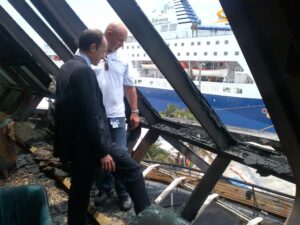
Those of you who follow me regularly know that cruising is one of my favorite activities. I love boarding a vessel, hitting the ocean and marveling in the vastness of the world that surrounds you as the ship glides through the waves.
I’m not loyal to any particular line and there is only one which I will never set foot on. They shall remain nameless. I mix up my cruise experiences in order to experience different classes of ships, see how different lines define customer service and of course, enjoy fine dining at sea. To me, it’s not about the destination, but the ship. Which pretty much sums up the reason why I very rarely get off the boat when in a port-of-call.
Over the past several months, the cruise industry has had its share of bad publicity. From the sinking of the Costa Concordia, to the exaggerated reports of norovirus, to the recent fires aboard the Carnival Triumph and Royal Caribbean’s Grandeur of the Seas, PR teams have been working overtime.
Since cruising, social media and red heads are all passions of mine, I’ve been following the Grandeur of the Seas fire and the work that the Royal Caribbean teams have been doing in the social media world intently.
Shortly after the fire broke out, the Royal Caribbean social media team took to Facebook and Twitter with posts that acknowledged the fire, told when guests were released from their muster stations, what the current status of the ship is, where it’s headed and when executives would be arriving to meet with guests onboard. Photos of the damage, executives sitting down with passengers and even people getting off buses were posted.
Questions posed by the media and others on Twitter and Facebook were promptly answered.
In my opinion, Royal Caribbean did a great job in handling a nasty situation for the company.
How would your company handle a situation like this?
I remember several years ago, my online store TheFerretStore.com, had a mini-crisis situation. We had a private label ferret food manufactured for us by a pet food company in New York. We literally sold tons of the product each month in three different size bags and they were shipped all over the country and to Japan.
It turns out that one of the ingredients used in one batch of the food had to be recalled. This impacted hundreds of bags of product and also put a dent in our product availability.
We were able to contact every customer who was impacted, explain the situation to them, ship them new product and tally up the costs this incident set us back. We communicated openly and honestly with our customers and managed not to lose a single one due to lack of trust.
Luckily for us, there was no Facebook or Twitter at the time, so we didn’t have to fight the social media storm a recall would generate.
During the history of Solid Cactus, there were some more modern-day PR issues that had to be fought in social media such as politics related to a move out of a downtown location and a downsizing we had to endure in 2009. Thick skin, vodka and a good team were definitely required!
When it comes to crisis PR there are a few commandments any size business needs to follow:
- In the face of crisis the first thing anyone wants to do is downplay the situation, look for ways to hide some of the horrifying details to save face and spin the story in a way that wont make you look too bad. However, that is not the way to handle it! You need to communicate the facts openly, honestly and in full. The media today is smart, tell everything you know at the time to save yourself from answering questions as to why you didn’t disclose.
- When communicating sensitive information with employees and other key individuals on your team, use the phone rather than use email, text messaging or other forms of communication.
- Don’t use the “no comment” answer to questions. It looks like you’re hiding something and gives the media ammunition to start digging.
- Don’t be a Monday morning quarterback. You can’t speculate on what could have happened if you did so-and-so.
- Rumors will flow. Respond to them immediately with accurate information which dispels the false information.
- Don’t hide the CEO or owner of the company. Many CEO’s like to hide behind a press agent or a company spokesperson. That doesn’t cut it these days. In the face of crisis, people want to hear from the top dog. If the CEO isn’t fully briefed on the situation and isn’t prepared to speak about the issue at hand, have him field questions along with the person with the information that can answer.
Above all, honesty is the best policy when it comes to managing crisis PR. Give the facts as you know them and provide updates on the situation as often as necessary. Royal Caribbean did all this and more and prevented a barrage of negative press associated with the fire.
Hopefully your business will never have to go into crisis PR mode, but nothing is guaranteed. If you don’t already have a crisis PR team in your company, now is the time to put one together. It should consist of your CEO, your company spokesperson, your lawyer and key management, and those team members who will be responsible for social media and responding to the press.
They should be advised of your company’s policy in the event of a crisis as well as the points I spoke of above. When crisis hits, those should be the people who assemble and formulate the plan of attack.
Remember, news travels quickly now thanks to social media! You have to react just as quickly, so be prepared.
